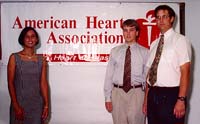 From
left are Julie Iannini, Scott Kribbs and Chadwick Thomas.
From
left are Julie Iannini, Scott Kribbs and Chadwick Thomas.Students research heart failure
 From
left are Julie Iannini, Scott Kribbs and Chadwick Thomas.
From
left are Julie Iannini, Scott Kribbs and Chadwick Thomas.
American Heart Association fellows Chadwick Thomas and Scott Kribbs explores why a potent hormone makes breathing difficult for patients with heart failure
Normally medical students Chadwick Thomas and Scott Kribbs would have spent the past year in the clinics or classrooms. Instead, as American Heart Association fellows, they took a year away from their medical school curriculum to work full-time on cardiovascular research.
What they learned could result in new treatments for heart failure. It also helps explain how a potent hormone in the body can make breathing more difficult for patients with heart failure.
Thomas, a fourth-year medical student, explored how the heart dilates with heart failure. He found that a novel family of enzymes, the matrix metalloproteinases, which have the capacity to destroy heart tissue, were increased in patients with severe heart failure. In these patients, the expression and activity of this enzyme system was significantly higher. In normal tissue, however, the enzyme system was barely detectable. Learning how this enzyme system is controlled during the development of heart failure may result in new treatment therapies for this fatal disease.
Kribbs, a third-year medical student, researched how the potent hormone endothelin may influence lung function with the development of heart failure. The lung is an important site of the synthesis and uptake of endothelin. In patients with heart failure, endothelin levels in the bloodstream are three to four times higher than normal. Kribbs identified that the lung takes up a large amount of endothelin, which results in increased pressure within the lung circuit. Thus, increased endothelin may make it even more difficult for patients with heart failure to breathe.
Iannini named Student Scholar in Cardiovascular Disease and Stroke by American Heart Association
Her research helped pave the way for the development of a drug that blocks the harmful effects of a hormone on the hearts of patients with severe heart failure. To recognize her contributions towards the treatment of cardiovascular disease, first-year medical student Julie Iannini was named a Student Scholar in Cardiovascular Disease and Stroke by the American Heart Association.
This prestigious award is reviewed competitively at the national level.
Ianninniās research focuses on certain hormones in the blood stream that are present in higher levels in patients with severe heart failure. The levels of the hormone endothelin, in particular, are three to four times higher than normal levels in the bloodstream. In increased levels like these, endothelin can constrict the arteries and make the heart work harder. Ianninni also found that endothelin has other direct effects on the heart that can cause it to work less efficiently.
Her findings helped the pharmaceutical industry develop a drug to block endothelinās destructive effects, and in later research, she demonstrated the drugās success and showed that it actually improved heart function. The results of this study were recently published in the national journal Circulation. As she continues her medical career, Iannini plans to further her work with cardiovascular disease focusing primarily on the direct effects of endothelin on heart performance.